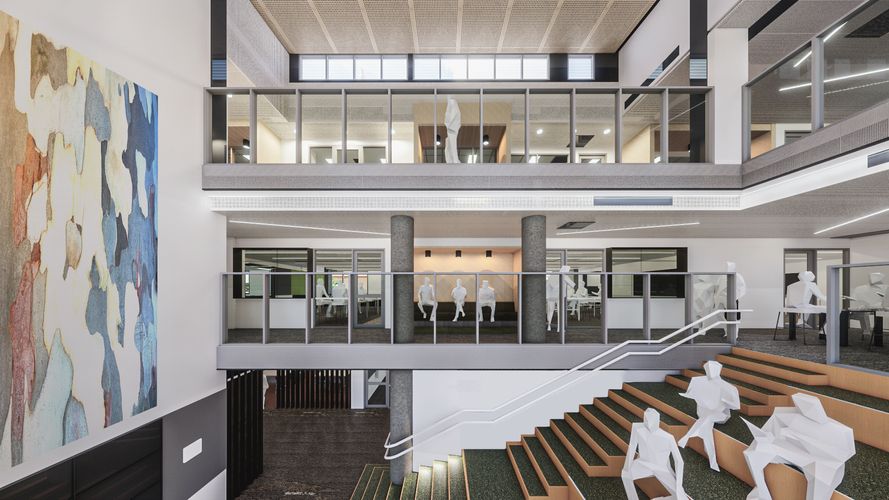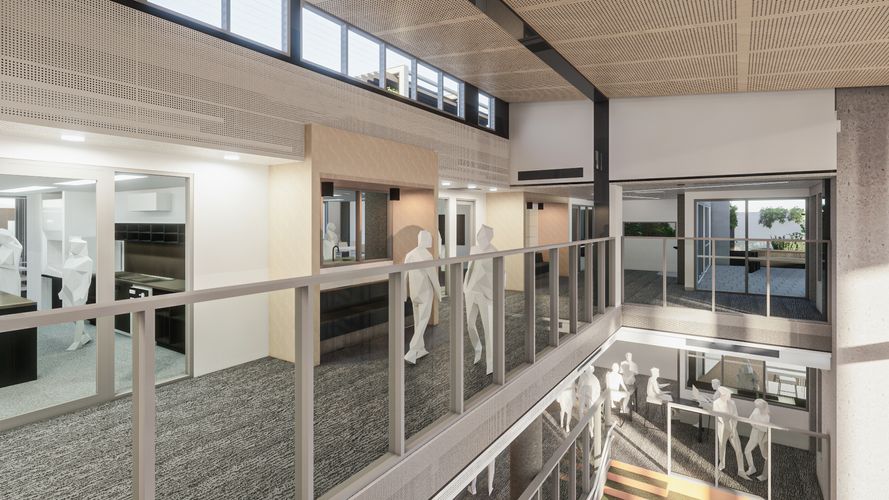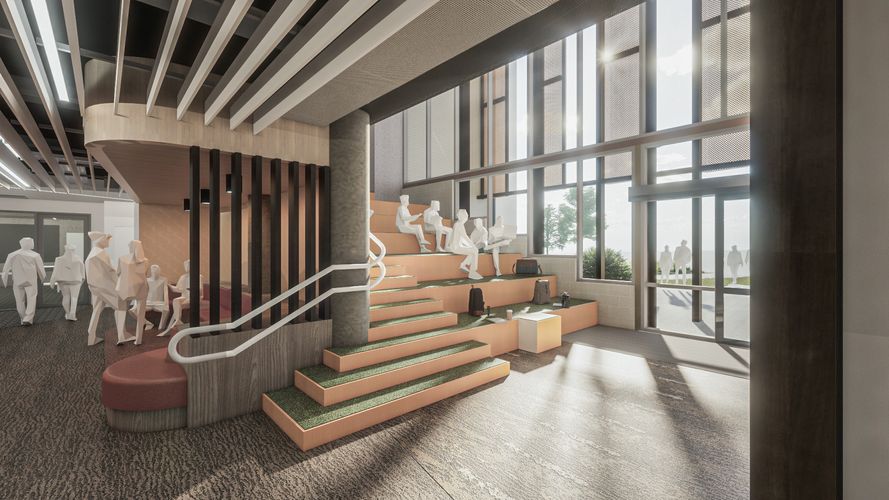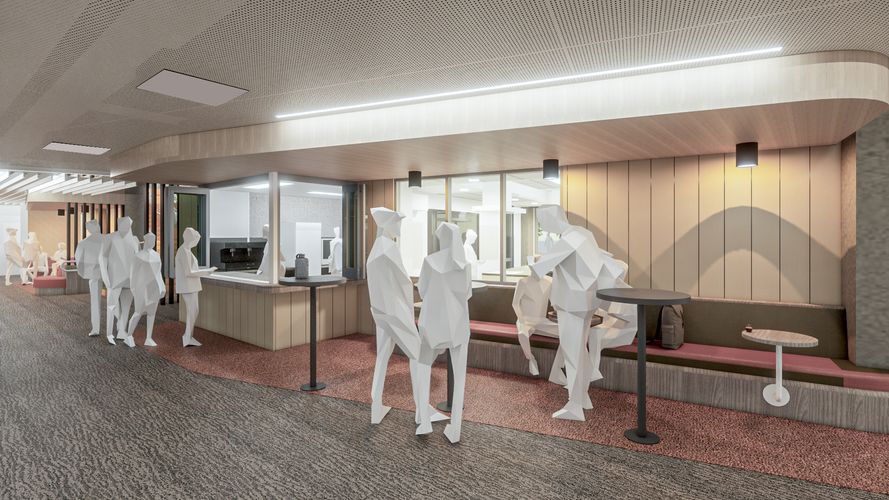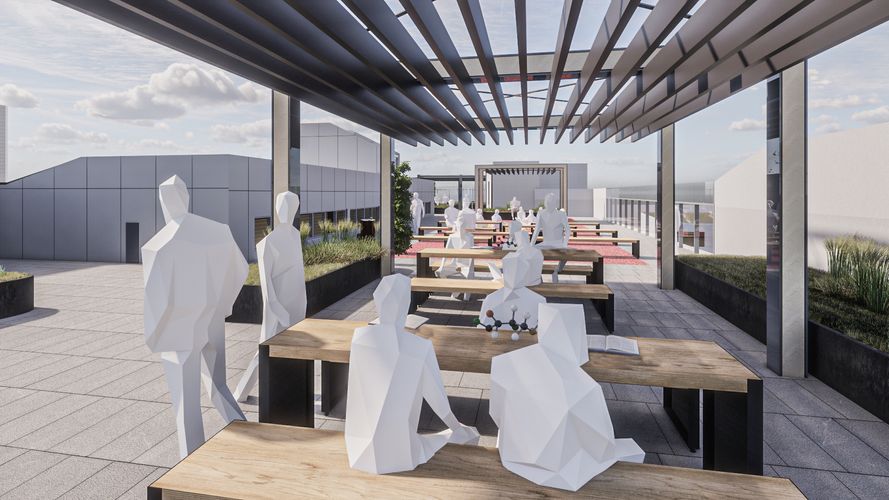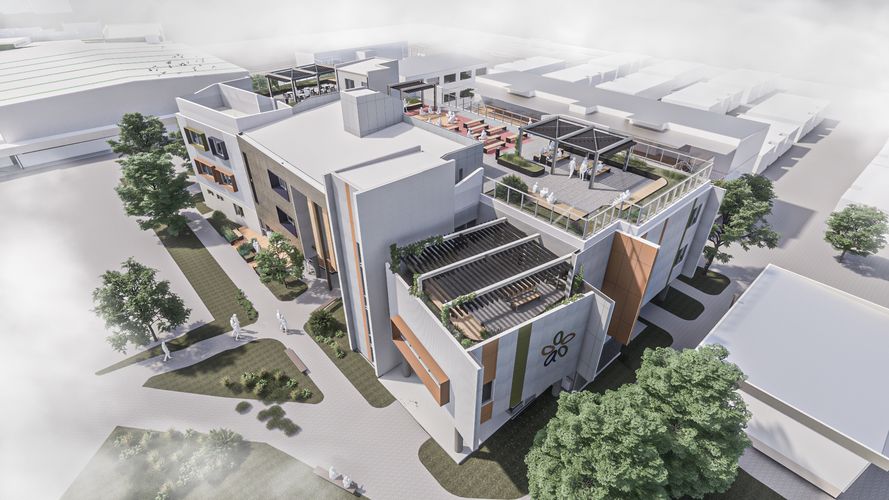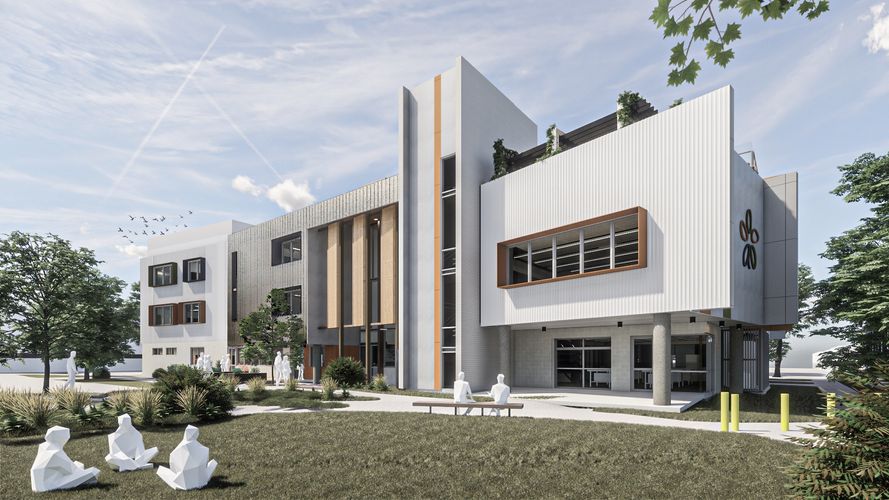WELCOME TO OUR SPACE
In the true spirit of our First Nations people we welcome ALL people into our space and we will treat each other with respect, dignity, and kindness.
We are committed to upholding the Charter of Human Rights and Responsibilities 2016. The Alamanda School community and learning environment is where all students are welcomed, accepted and treated equitably and with respect regardless of their backgrounds or attributes such as race, religious belief or activity, gender identity, disability or sexual orientation so that they can participate, achieve and thrive at school.
Proposed Secondary Building
Our Mission
Alamanda College has high expectations of all students and we encourage them to strive to achieve their greatest potential to make a positive contribution to a diverse and ever changing local and global society. We will aspire to be a school renowned as a vibrant community that lives the school’s motto of ‘Dare to be wise’, in all our thoughts and actions.
In embracing the College motto, we will develop creativity and innovation and encourage students to test the limits of their intellectual and physical capabilities whilst displaying their moral convictions through their actions.
We seek to provide a challenging education in a safe, supportive environment. We will strive to build positive relationships within a learning, caring and inclusive school community in order to achieve the best possible educational experience for each student.
Students and staff are expected to engage in the total life of the College and to actively pursue a range of learning opportunities. The ultimate aim is to develop personal qualities and attitudes that will enable students to face the challenges of the future with confidence.
Our Vision
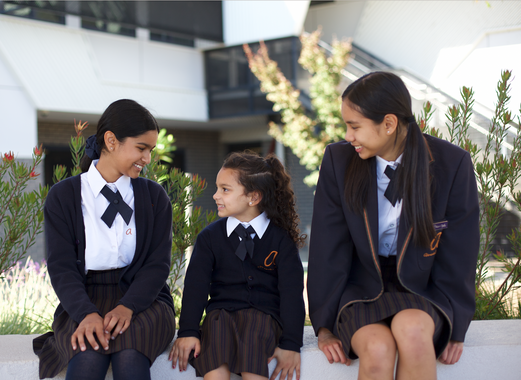
Alamanda College aspires to create a challenging learning environment that develops young people with active minds and ethical spirits who will be able to contribute wisdom, compassion, empathy, integrity and leadership in the global society of which they will all be members.
Our Story
Alamanda K-9 College is located in the growth corridor of Point Cook. Alamanda K-9 College strives to be internationally minded, and provides a supportive, nurturing and challenging learning environment, with high expectations for student success. The school’s philosophy is based on the International Baccalaureate. The College delivers the Primary Years Programme from Prep to Year 6. The Department of Education Middle Years Program has commenced implementation in 2016 and continues to be a flagship program for our Year 7, 8 and 9 students. Our aim is to develop inquiring, knowledgeable young people who are life long learners, great thinkers and problem solvers. There is a strong focus on professional development for all staff, which includes an emphasis on building leadership capacity and implementation of best teaching practice. The McRel and Marzano research-based instructional strategies are utilised across the school to ensure that teaching practices are purposeful, and are proven to have a high impact on student learning. Alamanda K-9 College is a 1-to-1-iPad school, and uses technology as a resource to engage students in their learning, and to meet their individual needs. In embracing the school motto, “Dare to be Wise”, we develop our intellectual and physical capabilities whilst displaying our moral convictions through actions.
Our Purpose
Alamanda College is structured into two sub-schools: Junior School – Prep to Grade 6 Middle School – Years 7 – 9.
the juior school is organised into a mini school structure (Prep, 1-2, 3-4, 5-6). Each mini school has a leadership structure of Assistant Principals and supporting leaders to ensure that the school has a focus on each and every learner. The priority of the school is the student. Alamanda College is accredited school in the Primary Years Programme in the International Baccalaureate Organisation. As we are associated with the International Baccalaureate (IB) staff at Alamanda College follow the IB’s Mission Statement and The Deopartment of Education Values.
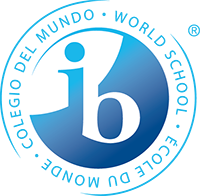
IB Mission Statement
The International Baccalaureate aims to develop inquiring, knowledgeable and caring young people who help to create a better and more peaceful world through intercultural understanding and respect. To this end the IB works with schools, governments and international organisations to develop challenging programmes of international education and rigorous assessment. These programmes encourage students across the world to become active, compassionate and lifelong learners who understand that other people, with their differences, can also be right.
IB Values
Alamanda College aspires to create a challenging learning environment that develops young people with active minds and ethical spirits who will be able to contribute wisdom, compassion, empathy, integrity and leadership in the global society of which they will all be members. The IB PYP attitudes and learner profile underpin this work across the school.
IB Learner Profile
Inquirers- They develop their natural curiosity. They acquire the skills necessary to conduct inquiry and research and show independence in learning. They actively enjoy learning and this love of learning will be sustained throughout their lives.
- Knowledgeable– They explore concepts, ideas and issues that have local and global significance. In so doing they acquire in – depth knowledge and develop understanding across a broad and balanced range of disciplines.
- Thinkers– They exercise initiative in applying thinking skills critically and creatively to recognize and approach complex problems and make reasoned, ethical decisions.
- Communicators– They understand and express ideas and information confidently and creatively in more than one language and in a variety of modes of communication. They work effectively and willingly in collaboration with others.
- Principled– They act with integrity and honesty, with a strong sense of fairness, Practice and respect for the dignity of the individual, groups and communities. They take responsibility for their actions and the consequences that accompany them.
- Open–minded– They understand and appreciate their own cultures and personal histories and are open to the perspectives, values and traditions of other individuals and communities. They are accustomed to seeking and evaluating a range of points of view and are willing to grow from the experience.
- Caring-They show empathy, compassion and respect towards the needs and feelings of others. They have a personal commitment to service and act to make a positive difference to the lives of others and the environment.
- Risk–takers– They approach unfamiliar situations and uncertainty with courage and forethought and have the independence of spirit to explore new roles, ideas and strategies. They are brave and articulate in defending their beliefs.
- Balanced– They understand the importance of intellectual, physical and emotional balance to achieve personal well being for themselves and others.
- Reflective– They give thoughtful consideration to their own learning and experience. They are able to assess and understand their strengths and limitations in order to support their learning and personal development.

Department of Education Values

- Integrity
- Responsiveness
- Impartiality
- Accountability
- Respect
- Leadership
- A commitment to human rights.
Department of Education Vision
Together we give every Victorian the best learning and development experience, making our state a smarter, fairer and more prosperous place.
Environmental Context
2013 was Alamanda College’s inaugural year, commencing with 371 enrolled students. The College experienced significant student growth throughout the school year and currently has an enrolment of 3350 students. We anticipate that this growth rate will be maintained with the continual development of our local area. Alamanda College has a high proportion of students with English as an additional language. Alamanda College is located in the south side of Sneydes road, Point Cook. Residents of Alamanda are from a mid to high socio economic background. Most two parent families have both parents working. This is a diverse and multi-cultural community with 93 different nationalities represented. The school is in a growth corridor to the west of the Melbourne city centre. The homes have been newly established within the Alamanda estate, with community facilities such as the clubhouse, gymnasium and a cafe supporting the immediate population.
Student cultural backgrounds include: South African, Indonesian, Indian, Malaysian, New Zealand, Dutch, Chinese, Greek, English and Australian. Our staff cultural and linguistic backgrounds include: Australian, Chinese, Italian, Armenian, South African, Greek, English, Scottish and Canadian. The school provides Mandarin as an additional language as a large percentage of students are of a Chinese background.
Why Alamanda College
Rapidly changing circumstances and opportunities demand the continuing acquisition of new knowledge, skills and understandings. Alamanda College understands the importance of encouraging and sustaining students’ effective engagement with learning, well after the students have left school. In order to participate effectively in the ‘information societies’ of the new millennium, we recognise that an individual needs to be better-informed, to have greater thinking and problem-solving abilities, to be more self-motivated, than ever before.
As a “thinking school”, our teaching and learning program will involve all students from Prep to Year 9, and introduces tools such as de Bono’s Thinking Hats, Mind Mapping, DATT Tools, Socratic questioning methods and a variety of cognitive thinking processes and strategies that equip our students with the skills to navigate through an information rich future. The College teachers and students will integrate digital pedagogies throughout the curriculum. Digital pedagogies are new ways of working with learning and ICT to facilitate quality learning experiences for this generation of students. They support personalised and authentic learning and promote the ability to learn and understand within a global context and enable learning experiences to be broadened and depended.
Alamanda College will be structured into five sub-schools:
Prep – The Burrow
Years 1 & 2
Years 3 & 4
Years 5 & 6
Years 7, 8 & 9
With the priority of the school having students are the centre, teaching and learning programs acknowledge the complex needs of each individual child and values and nurtures their childhood. Our programs will be diverse, yet revolve around a strong commitment to the development of essential literacy and numeracy skills, along with knowledge and understanding of the world. In Prep we will incorporate many of the philosophies and practices of the “Socratic questioning and critical thinking”, in which the curriculum is childoriented and teacher-framed, with practises that investigate the “Reggio Emilia approach”. Classroom spaces will be carefully organised for small and large group interaction, while intimate spaces are created as quiet, safe places for one or two children to learn. Central to our philosophy is that play and investigative inquiry is the best learning medium for young children, encouraging them to explore, experiment and develop social, physical and language skills. Numeracy and literacy are key elements, along with knowledge and understanding of the world.
From Years 1 to 6 the curriculum progresses towards more discrete subject areas. The school will investigate the opportunities offered through the International Baccalaureate Primary Years Programme. All skills involved in literacy learning, including reading, writing, spelling and communication skills will be taught both explicitly as well as through an integrated approach.
Children will be working in mixed ability groups whilst receiving differentiated instruction to allow all students to be challenged and literacy support will be provided to those who need additional assistance in these crucial early years. Mathematics teaching will feature a variety of methods of instruction, from student-centred group or whole-class discussions, small-group investigations, to individuals working one-on-one with another student or the teacher. This classroom interaction helps build relationships among students and between students and the teacher and goes some way towards addressing the varied learning styles and ability levels found in the mathematics classroom. At Alamanda, children will be encouraged to be caring and responsible people, who work and cooperate with others while acquiring vital knowledge and skills. We will place a strong emphasis on the core subjects of Literacy, Numeracy, Science, History/Geography, Information & Communications Technology, Health and Philosophy. Our classrooms will be modern and well equipped with up-to-date technology including personal iPads and MacBooks. The core curriculum will be supported by a range of specialist teachers contributing to a broad and balanced curriculum. Research tells us that a positive partnership between parents and the school is one of the most powerful contributors to enhanced student outcomes. At Alamanda, we will embrace parental involvement and work with the benefits this will bring.
Middle School - (Year 7-Year 9)
Middle schooling provides a nurturing environment grounded in the developmental stages and needs of all adolescents. It is supported by the expertise of a team of staff dedicated to working with students in Years 7 to 9. The Middle School offers a welcoming community and secure environment that promotes self-confidence, independence, personal responsibility and self-expression. Key Middle School learning principles, that guide our curriculum design and development, include:
1. Actively committing to an agreed approach to literacy and numeracy teaching and learning, which will be documented for all teachers.
2. An approach to learning that will be student- driven.
3. Students will build on their world knowledge to support all areas of learning and enhance academic success.
4. The development of independence through collaboration and teamwork.
5. Teachers planning collaboratively through Professional Learning Teams to integrate key concepts about curriculum designs for a globalised world into current models and maps for curriculum, instruction and assessment.
The Middle School aims to support students in a variety of ways, including academic rigour, learning to learn, self-directed learning, collaborative learning, awareness of self and others, curriculum integration, community service, effective communication, and providing an enjoyable and secure environment to promote learning. To ensure our students are engaged with their schooling at this critical time, Alamanda offers a stimulating and rigorous academic program, incorporating a flexible curriculum with choice and more intensive learning through projectbased work and electives. All students study Mathematics, English, Science, History, Health & Physical Education, The Arts (performing and visual), LOTE (Mandarin), and Technology. Information & Communications Technology is also integrated across the curriculum to enhance learning outcomes.
The Arts: The Dream… a work in progress
The Arts is an important aspect of a rounded education. It encourages development of the right hemisphere of the brain, with a focus on fostering creativity and providing students with the opportunity to develop their passion for The Arts. It also encourages students to express themselves, to communicate more effectively, to develop a sense of teamwork and to value and nurture individual gifts and talents. The Arts program will encompasses media, drama, visual arts, photography, music and dance. Students will be able to incorporate instrumental tuition and according to their age and proficiency, are able to join a concert band. Visual art, music and drama will be integrated into educational experiences for students from Junior School to Year 9, where they are offered a variety of opportunities. This area of study will be a work in progress over the coming years.
Sporting and Outdoor Education Program: Healthy mind, healthy body
Alamanda students will participant in sporting and outdoor education programs including after school sports training and competition against other schools. Inter-school sports will be scheduled for the Junior and Middle schools. Alamanda will create a strong sporting culture. Participation in sports provides life skills well beyond the focus of sports itself. These values are also enhanced through involvement in our House sporting events – A journey full of fun excitement and healthy competition.

